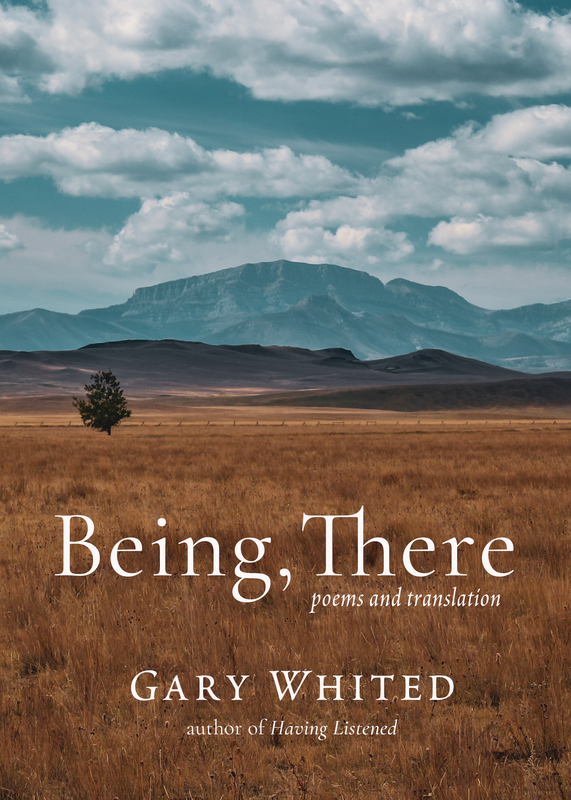Praise For Being, There
|
This is a great book. The exactitude and the clarity of the writing is in the knowledge that we gain from Gary Whited’s growing up on a ranch on the prairie. Whether he is describing a cow or a fence post, the writing is always true to itself, true to what he’s looking at, and utterly reliable. There’s never a moment when the writing is not totally true to his understanding of the lines, and how every line that follows is trustworthy in its attachment to the elemental truth of the place.
--David Ferry, author of Bewilderment and translator of The Aeneid There is a witnessing happening in Gary Whited’s Being, There; an attentive being-present. The pastoral form nods to Georgics but don’t be fooled: Whited’s Virgil is Parmenides of Elea, and it is Whited’s metaphysical questioning that guides us through these poems, “where nothing and forever mingle.” Each word here is deeply earned—as W.S. Merwin wrote, “they have been there.” The poems in this slim volume hold so much silence your ears will ring with it for the rest of your life. Whited invites you to listen “as though your life depends on it.” --Anna Badkhen, Guggenheim Fellow, author of the National Book Award-nominated Bright Unbearable Reality. The title, Being, There, concisely and exactingly focuses the essence of this brilliant collection.“Being” as in the superbly lyrical translations of the great Presocratic philosopher-poet Parmenides; “There” as in the austere beauty of the prairies of Montana; and the comma that looks both ways, both conjoining and differentiating: the perfect inscription for Gary Whited’s acutely receptive, and marvelously supple poetry. In this poet’s gifted Virgilian hands farm labor is both Seamus Heaney-like in its rich linguistic texture and profoundly Greek in its metaphysical understanding of Necessity (Ananke). Whited’s sensitivities as a trained philosopher and psychotherapist are everywhere in evidence, but it is poetry that addresses what for him is the essence of his calling, and what the ancients once termed “the medicine of sorrow.” In his poem, “Deep Disturbance,” what begins as a childhood recollection of castrating a calf, ends with these sublimely moving lines: one of those body memories psychotherapists search for in trauma work when naming how the body hangs onto its history without words, stored in the tissue, its cells tied together in knots, and when this one awakens, unties itself, I hear the calf’s helpless cry. He hears the pain of his fellow suffering creatures, as he hears Parmenides in the stones of Elea, and hears the unspoken truth of life in the stoicism of his hard-luck rancher father. When Gary Whited translates the ancient language, it could be speaking directly from his father’s mouth, in the wide-open, meditative spaces of Montana: The name for what, alone, is fully untroubled is to be. It troubles his listening enormously. --George Kalogeris, author of Winthropos. |
Gary Whited’s new collection is a meditation on Being. Traveling through time to re-encounter his childhood on his father’s ranch in Montana, he probes his own nature with psychological acuity, philosophical insight, and startling clarity of image. “Now I unroll each memory of these earthly things,” Whited writes, and we are wholly with him as he hoists a pail full of milk, reaches inside a cow to help her calf get born, or distributes “hay to all the four-leggeds” and “water, always water, to us all.” Set side by side with his luminous translations of fragments from Parmenides, Whited’s deeply felt and powerfully realized poems open new paths into how we understand woundedness, healing, and the nature of existence.
--Jennifer Barber, author of The Sliding Boats Our Bodies Made A wonderful paean to the pre-Socratic Parmenides (translated here by Whited), to travel and art, and the nourishing core of human culture; but also to the grit of a working ranch, a hard day's labor, the guilelessness and grace of a domesticated steer, pig slop, and pitchfork. It's one of Whited's gifts to see the congruence between these two worlds without romanticizing or belittling either. This is a beautiful book and strange, as the deeply familiar once forgotten seems strange. It is a wonder-welcoming experience, a masterclass in close listening....and holds in its pages a wisdom that, as Whited says, "has been still for a long time.” --Kim Garcia, author of DRONE and Brighter House |

